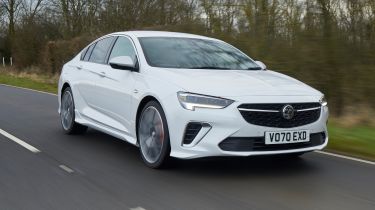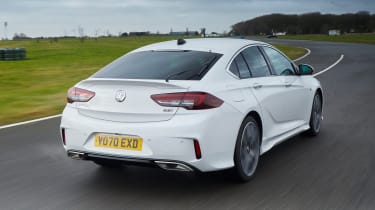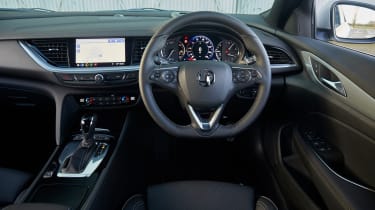New Vauxhall Insignia GSi 2021 review
We find out if the new Vauxhall Insignia GSi has enough to worry the sporty saloon elite

Verdict
The Insignia remains a very pleasant, relaxing machine in which to cover miles following the latest batch of updates. However, as a GSi model it makes little sense. If you can live without four-wheel drive, the cheaper petrol is almost as quick and at least £5,500 cheaper. We’re yet to sample the new 1.5 diesel, but on paper it looks set to be the pick of the range.
The Vauxhall Insignia has been revised for 2021, and our first experience of the updates line-up comes in the form of the range-topping GSi model. With the brand’s hottest VXR nameplate missing from the Insignia - and soon to be set aside for a range of sporty EVs - this is as hot as it’ll get for this generation.
The GSi was offered to Insignia buyers before the facelift, both in petrol and diesel forms. Though if you’d done so much as blinked, you’d have missed the former - with emissions of 197g/km on the old NEDC testing benchmark, Vauxhall chopped it from the UK market after barely a month on sale.
But now the petrol is back thanks to an all new engine and gearbox. The changes come as part of a much wider-reaching list of revisions to the engine range, including new diesel units. There’s also some safety tech upgrades and subtly revised styling.
Used - available now

2023 Audi
Q4 Sportback e-tron
54,526 milesAutomaticElectric
Cash £23,363
2022 Kia
Niro
18,315 milesAutomaticPetrol1.6L
Cash £17,900
2023 Nissan
Juke
40,858 milesManualPetrol1.0L
Cash £12,287
2022 Volkswagen
T-Roc
36,779 milesAutomaticPetrol1.5L
Cash £18,600From the outside, the facelift features a wider grille whose chrome inserts and surround bring the face more closely in line with the brand’s latest look found on cars like the Corsa. The front bumper is redesigned and the fog lamps are moved further towards its edges, while the headlights have been slimmed down. The GSi is set apart from the lower trim levels courtesy of some 20-inch alloy wheels, deeper front and rear bumpers, sportier side sills and a pair of twin tail pipes.
Silver trim aside, very little has changed in the cabin. As before it’s very spacious - if not quite as vast as the Skoda Superb - and the GSi model features some very serious-looking sports seats. Settle into them and they prove to be exceptionally comfortable, and they’re both heated and cooled as standard.
While most of Vauxhall’s latest models now make use of the underpinnings, engines and tech from the PSA Group (now joined with FCA to form the vast Stellantis empire), the GSi makes use of a petrol engine developed under previous owners General Motors. The 2.0-litre turbocharged unit is all new, much like the nine-speed automatic that it’s attached to.
The result is actually a drop in power - 227bhp versus the previous 260bhp. Torque is down by 50Nm too - now 350Nm. On paper, that hasn’t made a vast difference: a 0-62mph time of seven seconds is just one tenth behind the old car’s benchmark.
Out on the road, the GSi feels brisk rather than truly rapid; the surge respectable rather than exciting. There aren’t many thrills to be had from the new gearbox either: it shifts smoothly enough, but it often struggles to decide on which of the nine gears is the right one to use. It’s still better than the manual override though, which is very slow to respond to the driver’s input - if it even responds at all.
There are other engines available throughout the range. The same 2.0-litre is available in a detuned form - it offers 197bhp but the same 350Nm of torque. There’s also a new entry-level diesel: a 1.5-litre three cylinder unit with 120bhp, plus a 2.0-litre diesel with 172bhp.
The GSi is the only Insignia to get a four-wheel drive system, though. Called Twinster, the switchable layout uses a pair of clutches in place of a traditional differential to enable a torque vectoring system which can divert drive to whichever wheel has the most grip.
The traction benefits were easily appreciated in the miserable, sleety conditions of our test drive. An enthusiastic launch from a standstill in front-drive mode will see the GSi scrabble around for grip on wet tarmac as the tyres struggle to deploy the torque sent their way. Prod the AWD button on the centre console, and the same manoeuvre becomes faster, cleaner and drama free.
The Twinster system is also put to work at corner exit, as it tugs the car towards the apex at a point where the front-wheel drive mode starts to wash wide. Useful if you feel the need to press on in poor conditions.
The rate of steering response reacts differently based on which drive mode is selected. In the everyday Tour and Normal modes, it’s light and perfectly fine for most situations; Sport mode introduces a little more resistance into the rack. Whichever mode is chosen, precision is a strong point and feedback isn’t.
All Insignias get an electronic brake-by-wire system, but the GSi features uprated Brembo four piston brakes, which easily feel up to the task and give a reassuring feel through the pedal.
Adaptive dampers are standard on, and exclusive to, the GSi. In theory they should firm up in the more focussed driving modes, but the differences are so subtle that most people would be very hard-pressed to appreciate any difference in body control or comfort. It’s not a big deal though, as the ride is well judged anyway: just firm enough to suggest some form of sportiness, but forgiving overall.
Vauxhall says that the Insignia is class leading when it comes to aerodynamic efficiency, and the most gentle of whispers of wind noise at motorway speeds certainly doesn’t make us doubt that. It’s a shame that the GSi, riding on large 20-inch wheels, generates quite an appreciable amount of road noise though - it’s a small complaint in what is otherwise a brilliant long-distance cruiser.
So what of the promise of increased efficiency? Even against the tougher emissions standards set by the WLTP testing regime, the new engine/gearbox combination reduces emissions dramatically, to 181g/km. This will certainly make the GSI more affordable to private buyers: the first year VED now comes in at £870; had the old unit been tested to the latest WLTP standard, it would likely have been placed two bands higher, resulting in an initial cost of £1,850. It also benefits Vauxhall itself - the more efficient engine helps to trim the brand’s average emissions rating, which would reduce the likelihood of being slapped with hefty fines.
However, for company car buyers, that cleaner engine doesn’t make much difference. Any car with emissions over 170g/km falls into the highest 37 per cent bracket, so the GSi remains in the most expensive category.
The emissions problem is pretty insignificant compared to the GSi’s biggest sticking point, though: price. Traditionally, one of the Insignia’s greatest strengths has been a competitive purchase figure - it still is in the basic diesel SE Nav, which starts from a very tempting £23,795 - but the range-topper will set you back £38,125. If you can do without the nice 20-inch wheels and those seats, the front-wheel drive 197bhp petrol is almost as quick, and can be had in Ultimate Nav trim for £32,750. The same engine combined with the SRi VX Line Nav - which is still very generously equipped - is cheaper still, at £30,990.
Based on a typical finance deal, the GSi sets you back £567 per month over four years with a 10 per cent deposit. The SRi VX Line Nav will cost £113 less each month over the same period, with a deposit that’s £800 smaller.
With the 1.5 diesel priced so much lower, it looks set to become the best choice for most buyers. We’ll find out how it fares in the real world shortly, but it looks promising: officially, it achieves up to 61.4mpg and CO2 emissions of 121g/km - both of which top the most frugal diesel-powered (though admittedly more powerful) Skoda Superb.
| Vauxhall Insignia GSi | |
| Price: | £38,125 |
| Engine: | 2.0-litre 4cyl petrol turbo |
| Power: | 227bhp/350Nm |
| Transmission: | Nine-speed auto, four-wheel drive |
| 0-62mph: | 7.0 seconds |
| Top speed: | 147 mph |
| Economy/CO2: | 30.3mpg/181g/km |
| On sale: | Now |












